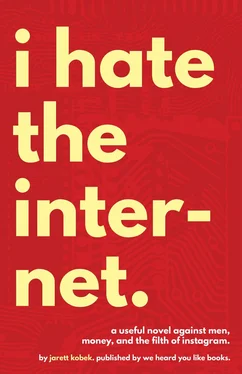She’d suffered fifteen years hearing about how the Internet would transform American culture and open new avenues of expression.
But in the end, it was only more people talking about television.
Before she started using Twitter, Baby had been the major source of Adeline’s information about television. Baby watched everything.
He liked The Sopranos, which was a television show about rich criminals. He liked Arrested Development, which was about a rich family whose patriarch is arrested for corruption. He liked The Wire, which was about the criminal justice system violating people’s civil liberties. He liked The L Word, which was about rich lesbians in Los Angeles. He liked Six Feet Under, which was about the sex lives of rich morticians. He liked Mad Men, which was about rich advertising executives. He liked The Shield, which was about the criminal justice system violating people’s civil liberties. He liked Breaking Bad, which was about a poor teacher who becomes a rich drug dealer. He liked The Borgias, which was about a rich family of Spanish nobility during the Renaissance. He liked Oz, which was about the criminal justice system violating people’s civil liberties. He liked The Trip, which was about two rich guys eating in restaurants. He liked Curb Your Enthusiasm, which was about a rich television producer. He liked Dexter, which was about the criminal justice system violating people’s civil liberties. He liked Sex and the City, which was about rich socialites in New York City. He liked 24, which was about the criminal justice system violating people’s civil liberties. He liked Game of Thrones, which was about rich aristocracies in a quasi-medieval world. He liked Weeds, which was about a rich drug dealer who goes broke and ends up rich. He liked Californication, which was about a rich writer in Los Angeles. He liked How I Met Your Mother, which was about rich socialites in New York City. He liked Reno 911! which was about the criminal justice system violating people’s civil liberties. He liked House of Cards, which was about rich politicians. He liked 30 Rock, which was about rich actors on television playing rich actors on television. He liked Sherlock, which was about a rich private detective violating people’s civil liberties.
Baby liked Girls, which was about four rich socialites in New York City. Each role was played by the daughter of real world socialites, the actresses’ parents having experienced success in the media and performing arts, thereby making the program the most perfect demonstration of the fact that, in the Twenty-First Century, America had abandoned its aversion to dynasties .
Dynasties were the very thing that America’s Rapist-in-Chief, Thomas Jefferson, had decried in a letter to George Washington: “I did not apprehend this while I had American ideas only, but I confess what I have seen in Europe has brought me over to that opinion; & that tho’ the day may be at some distance, beyond the reach of our lives perhaps, yet it will certainly come, when a single fibre left of this institution, will produce an hereditary aristocracy which will change the form of our Governments from the best to the worst in the world.”
Baby hated Doctor Who.
Doctor Who premiered on the BBC in 1963. The BBC was the British Broadcasting Company. The citizens of the United Kingdom paid for the BBC. It was nationalized television rendered as a service to the home nations.
Doctor Who was about an alien who traveled through time and space. The titular role of the Doctor had been played by many actors.
Because the Doctor was an alien, whenever an actor relinquished the role, the Doctor would suffer a fatal injury and then regenerate.
Regeneration was supercontained reincarnation. In the fictional context of Doctor Who, a regeneration meant that bright light would engulf the Doctor and then his body would change from one incarnation to another. His personality and face would be different. All of his memories were the same.
In the real world, regeneration meant the transition between actors was orchestrated with the dodgy special effects endemic to public television.
The one real constant in the various regenerations of the Doctor was that he always talked and acted like a British eccentric, thereby making Doctor Who, like Girls, a program about dynasties.
The most recent Doctor, played by the actor Matt Smith, was going to regenerate at the end of 2013. People on Twitter speculated about which actor would take up the role of the Doctor, and whether or not this actor would be a woman or a Person of Color .
A wide range of people on Twitter found this casting decision to be a very important issue. They believed that having a woman or a Person of Color as the Doctor would be a step forward for the representation of the disenfranchised in media.
Almost everyone alive, members of disenfranchised groups or not, wanted to be legitimated by intellectual properties in which they had no vested interest. The human species was a bunch of assholes.
This vocal segment of Doctor Who fans had a sophisticated understanding of the process by which television shows were made.
They understood that actors were cast. They understood the function of a head writer and executive producer.
Yet whenever an episode of Doctor Who aired, these very same people would tweet as if the fictional events depicted were really happening.
The tweets would contain outrage about the Doctor’s choices and the implications of those choices, and all the privilege and microaggressions revealed in those choices.
It was impossible to tell whether or not the users of Twitter understood that Doctor Who was fictional. It was impossible to tell whether or not the users of Twitter understood that the Doctor wasn’t real.
This inability to distinguish fiction from reality was also present in the world of comics.
Many comic book fans tweeted their complaints about the creators working for Marvel and DC. Some comic book fans tweeted their complaints about the editorial decisions made by Marvel and DC.
Almost none of these outraged tweets were about the ill-treatment of Jack Kirby or Steve Ditko or Joe Simon or Martin Nodell or Bill Finger or Jerry Robinson or Bill Mantlo or Alan Moore or Lew Schwartz.
Mostly, comic book fans were tweeting about Batwoman’s lesbian relationship with Maggie Sawyer or the death of Batman’s son Damian or the retcon of Superman’s marriage.
It was impossible to tell whether or not the users of Twitter understood that Batwoman and Maggie Sawyer and Batman and Damian and Superman were fictional characters.
Having worked in the comics industry, Adeline had experience with the interstitial space in which fictional characters were both real and not real. This was because Adeline had attended comic book conventions.
These events were, in theory, mass gatherings dedicated to the celebration of what the French termed le neuvième art.
In actuality, comic book conventions were an excuse for people to dress up like the intellectual properties of major corporations. Typically, the costumed would have encountered these intellectual properties in television, film, video games and comic books.
This pageantry was called cosplay. An example of cosplay would be when, for instance, a 45 year old man attends the annual San Diego Comic Con and dresses like Thor, a piece of intellectual property owned by Marvel/Disney and created by Jack Kirby.
Читать дальше












